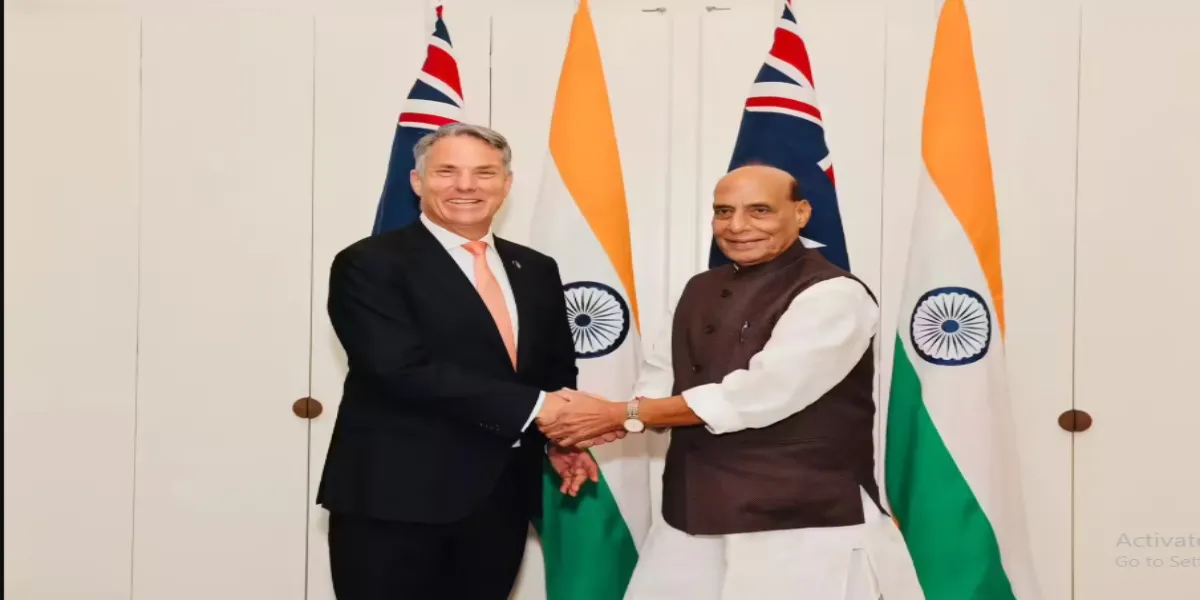In a landmark step towards strengthening bilateral defence cooperation, Raksha Mantri Rajnath Singh addressed the first-ever India–Australia Defence Industry Business Round Table in Sydney on 10 October 2025, reaffirming the growing strategic, industrial, and technological synergy between the two nations.
“Under our Comprehensive Strategic Partnership, established in 2020, we stand at a pivotal juncture — not merely as partners, but as co-creators of a secure and prosperous Indo-Pacific,” said Rajnath Singh, adding that the round table represents “a declaration of intent to make India and Australia natural allies in business, industry, and innovation.”
The Defence Minister noted that a series of high-level engagements — including the India–Australia Summit (November 2024), 2+2 Ministerial Dialogue (October 2024), and the visit of the Australian Deputy Prime Minister and Defence Minister to India (June 2025) — had paved the way for deeper cooperation. He emphasised that the relationship rests on shared democratic values, institutional similarities, and a common vision of peace and prosperity in the region.
Defence Industry Cooperation and Economic Progress
Highlighting India’s rapid economic and defence progress, Rajnath Singh stated, “India is now the world’s fourth-largest economy and the fastest-growing large economy. Our defence production reached Rs 1.51 trillion (approximately USD 18 billion) last year — the highest ever, marking an 18 per cent increase from the previous year. Defence exports have grown to Rs 23.6 billion (USD 2.76 billion), with Indian companies now exporting to nearly 100 countries.”
He called for stronger industrial collaboration, noting that India’s vast manufacturing scale, software excellence, and indigenous capabilities complement Australia’s strengths in quantum systems, autonomous underwater vehicles, and maritime surveillance. “This round table can be the catalyst that unlocks the unrealised potential in our industrial partnership,” he said.
Policy Reforms and Innovation
The Minister highlighted reforms such as Make in India, the Production Linked Incentive (PLI) schemes, and liberalised FDI policies allowing up to 74 per cent foreign investment under the automatic route, with further relaxation for projects introducing advanced technologies.
He underscored that the government’s focus on ease of doing business and policy simplification has created an enabling environment for innovation. “To boost defence R&D in the private sector, we have opened access to free-of-cost technology transfers through DRDO, fostering partnerships for developing cutting-edge technologies,” he said.
Joint Research and Development
Rajnath Singh noted ongoing collaborations between India’s DRDO and Australia’s Defence Science and Technology Group, including work on towed array sensors, and discussions in quantum technology, artificial intelligence, cyber security, and advanced systems.
He invited Australian companies to co-develop and co-produce high-end defence systems — from propulsion technologies and autonomous underwater vehicles to advanced materials and flight simulators — aimed at enhancing interoperability and regional resilience.
Expanding Maritime Cooperation
Highlighting India’s shipbuilding capabilities, Singh said, “Our shipyards have a proven track record in constructing and maintaining diverse naval platforms. We can offer refit, mid-life upgrades, and maintenance services to the Royal Australian Navy and vessels under Australia’s Pacific Maritime Security Programme.”
He cited successful industrial partnerships, including Indo-MIM Pvt Ltd with Thales Australia, Tata Advanced Systems with W&E Platt Pty Ltd, and Munitions India Ltd with Aqusport, showcasing how “business collaboration complements strategic intent.”
Strategic and Industrial Vision
Rajnath Singh welcomed Australia’s proposal for a reciprocal defence article and services MoU, noting that India’s designation as a “Top Tier Partner” reflects mutual trust and removes regulatory barriers for technology sharing.
“There are vast opportunities for co-production of naval vessels, ship repair, MRO support, and joint R&D in green shipbuilding and autonomous systems. By diversifying supply chains and investing in innovation, our nations can build a resilient, self-reliant Indo-Pacific,” he said.
He urged Australian businesses to invest, collaborate, and innovate with India, saying, “Together, we can develop advanced technologies and build platforms that serve as strategic enablers of peace and prosperity in the region.”
Joint Organisation and Participation
The round table was jointly organised by the Ministry of Defence (India), the Australian Department of Defence, the Newland Global Group, and the Australia–India Business Council. It was attended by Assistant Minister for Defence Peter Khalil, senior officials, diplomats, industry leaders, and innovators from both nations.
Concluding his address, Rajnath Singh said, “The India–Australia defence partnership stands at a defining moment. The convergence of strategic interests, industrial dynamism, and leadership vision gives us a unique opportunity to shape the Indo-Pacific’s future together.”





















